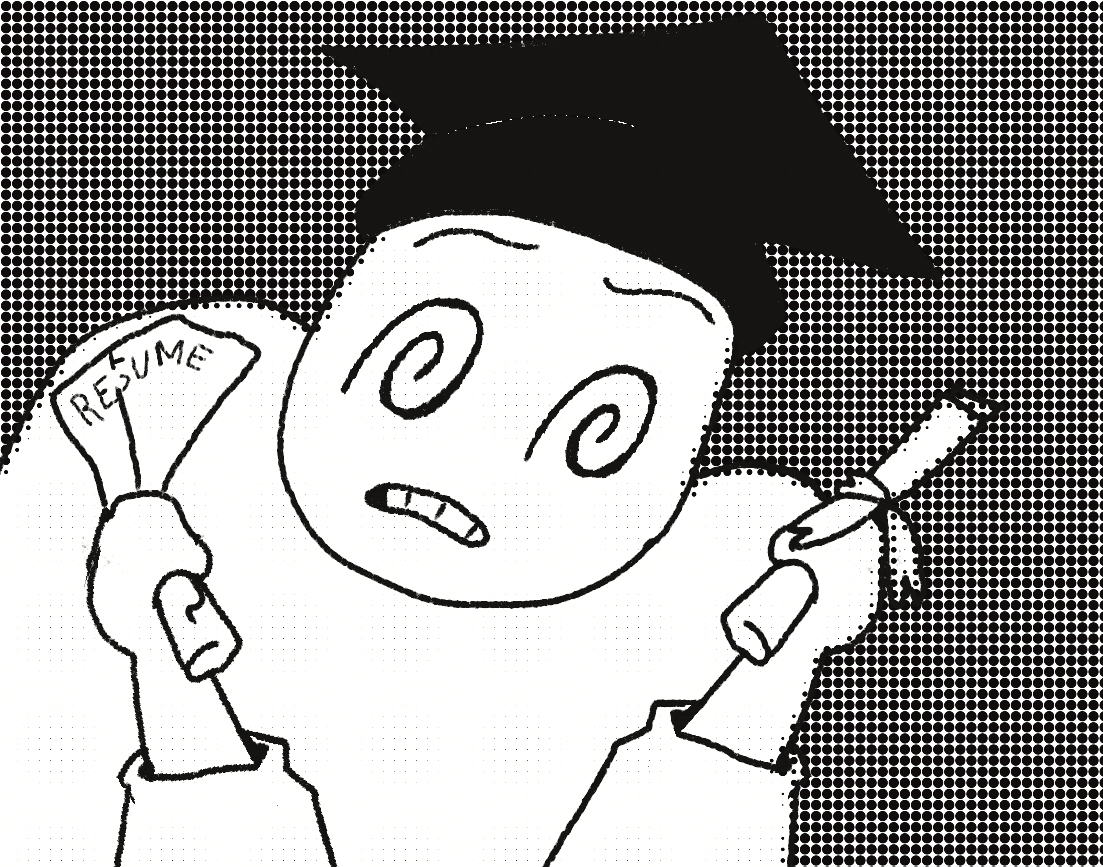Graduation for Pitt students is less than four weeks away on Sunday, May 4. With recent Trump administration policies, many seniors are feeling uncertain while stepping into the next stage of their lives due to an unreliable labor market and recession indicators.
Various Pitt students were able to secure jobs early in their final year, even in an uncertain job market. Paige Weitzel, a senior nursing major, landed a post-grad job in the fall as a trauma nurse at the Allegheny General Hospital. Weitzel said she didn’t have a lot of trouble finding a position.
“I feel like I’m in a special position [with] my occupation because of being a nurse,” Weitzel said. “Nurses are always needed, and everyone’s understaffed. So luckily, I didn’t have to deal with any issues beforehand.”
Other students were able to obtain job offers later in the year. Divya Narayan, a senior nursing major, said it took her until spring break to find a job but thinks that the ease of finding positions in the nursing field depends on the specialty. Narayan will be working as a bedside nurse in a hospital in Washington, D.C.
“I wanted to do pediatrics, and usually the demand for nursing is in general units. That’s where the shortages are. But that isn’t necessarily what I wanted to do,” Narayan said. “So I knew if I went down that path, I would have had no problem getting a job.”
Narayan said that her interest has always been in the pediatric branch of nursing, which made the job market more competitive because many hospitals have recently hired more people than needed or emphasized hiring internally.
“Pediatrics was hard because even children’s hospitals, like in Pittsburgh, were on a hiring freeze because they overhired in the past two years and didn’t have any open positions,” Narayan said.
Some fields are harder to find positions in than others. Brandi Ramcoobeer, a senior neuroscience and gender, sexuality and women’s studies major, is taking a gap year after graduation to get a job in research before applying to medical school for the fall of 2027.
Ramcoobeer said that applying to labs has been tricky since many are not hiring right now, due in part to recent NIH funding cuts and DEI-related research terminations.
“It’s a little difficult because I think some labs are obviously not looking for more people right now,” Ramcoobeer says. “It’s a little challenging when hearing back from some labs.”
The expenses after college can cause concern for some graduating students, especially with the current fall of the stock market and rise in the price of everyday goods. Aimee Carroll, a senior nursing major, will be working as a graduate nurse in a progressive care unit post-grad. Carroll’s biggest fear about post-grad life is the current cost of living.
“It’s quite frankly horrifying to be entering the real world right now,” Carroll said. “I think I’m going to live at home, so I think I’m in a unique situation [where] I can work full-time but still save a bunch of money compared to people who have to pay rent in this economy.”
Ramcoobeer said she is taking the struggling economy into account while planning her next steps in life.
“It’s definitely scary,” Ramcoobeer says. “I think I feel better about taking a gap year than before because now I can work and save up more money for whatever happens with the economy.”
Taylor Grim, a senior psychology major pursuing her Master of Social Work at Pitt’s School of Social Work after graduation, has felt the strain of rising prices in her everyday life going into graduation.
“Just having a dog and everything and having to provide for him, and recently [buying] a new car — that was pretty stressful for me,” Grim said. “I would say [all of that] kind of contributed to my anxiety towards becoming an adult in the real world.”
Narayan said that even though she doesn’t think she has to be concerned about job security in the nursing field, recent Trump policies regarding insurance and healthcare are still going to affect her occupation.
“My main concern working in health care is about insurance and access to Medicare or Medicaid,” Narayan said. “A lot of kids are on Medicaid and families need it … if that’s not able to be accessed by people, that’ll affect our care and how much we can take care of people in the hospital.”
Even with the uncertainty about the future, Grim said she believes that she and her fellow classmates will figure it out.
“In two years, we don’t know what our world will look like,” Grim said. “Everything’s really up in the air right now, and it’s a little scary to think about. We are just gonna have to keep chugging along and doing our thing.”


